life in 2.5 dimensions
feminism & weapons
0s+1s collective
dryckesbröderna
osäkerhetsprincipen
nollywood hustlers
ukiyo diary
ama-san
not one of them
a year of sisterhood
statement + bio
journalism & criticism
artist books
press
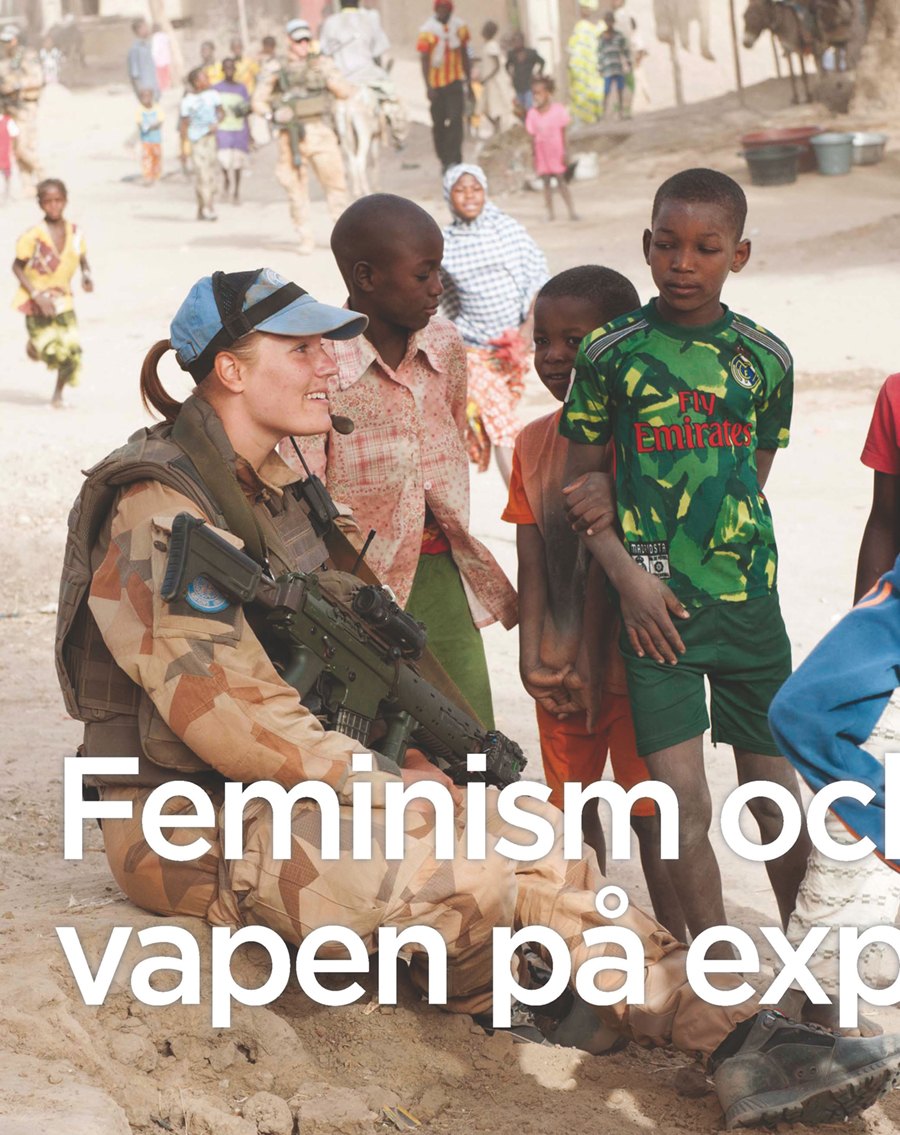
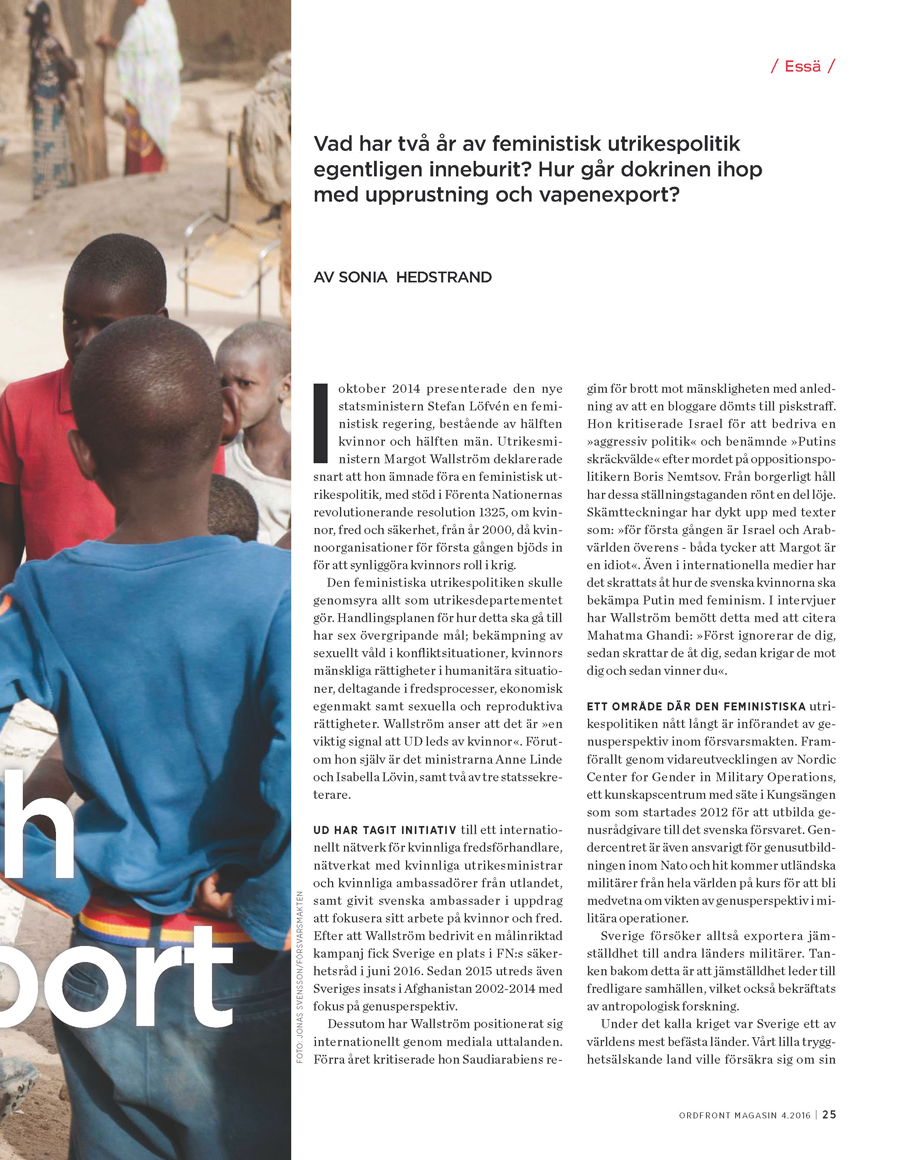
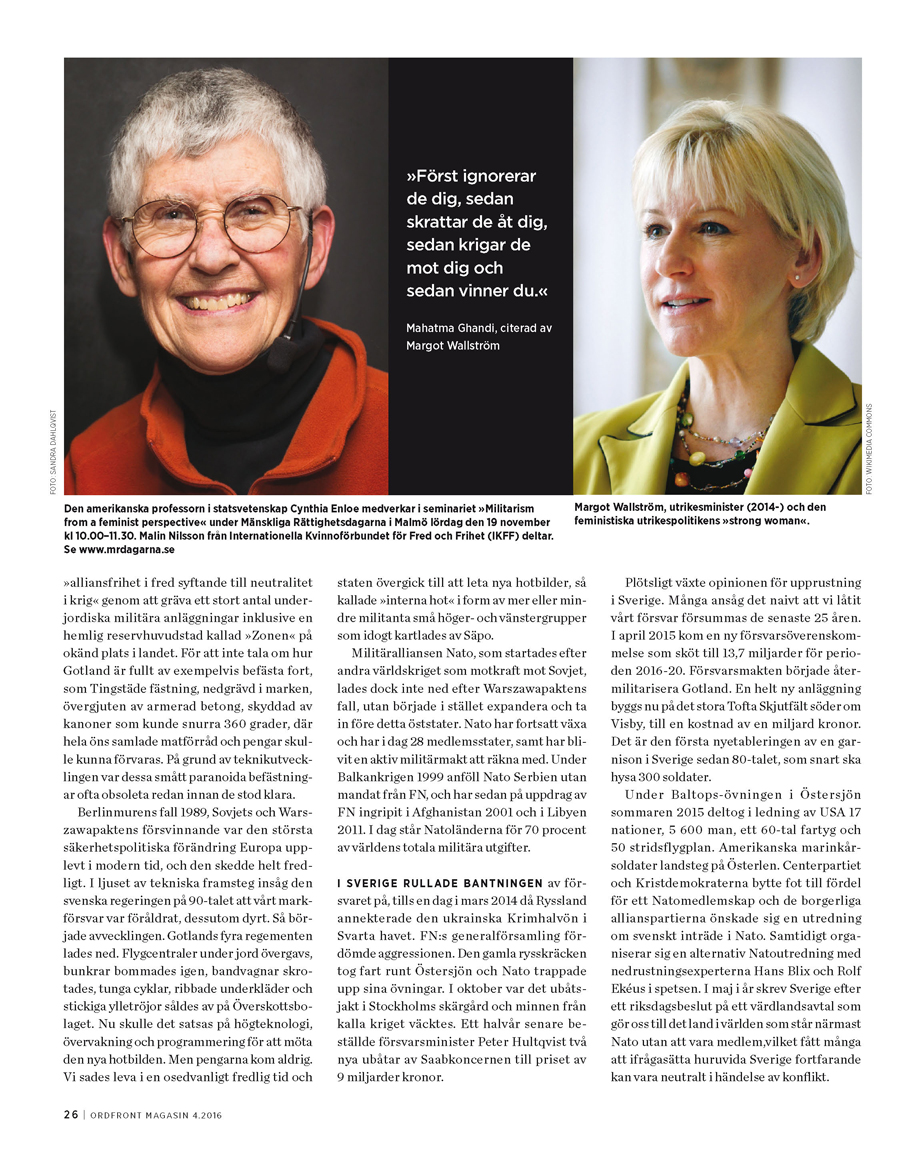
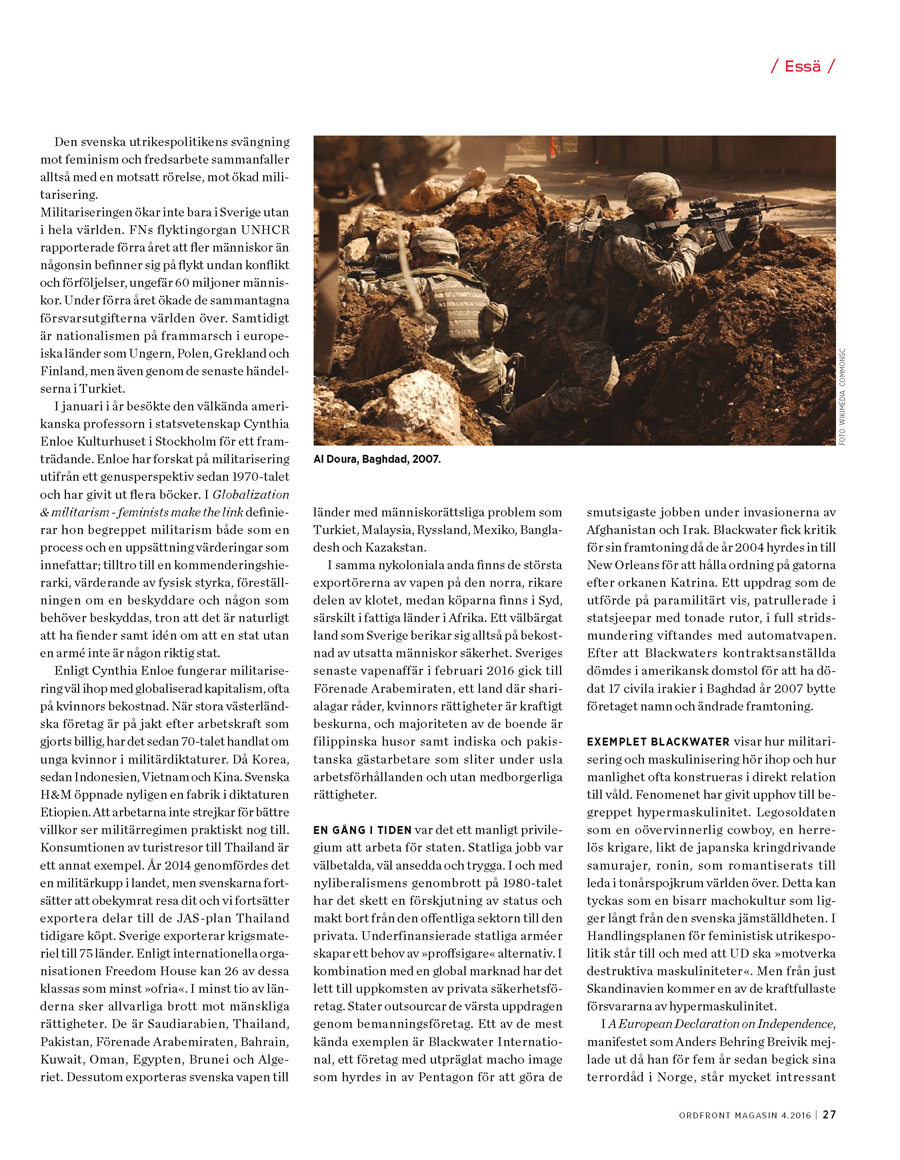
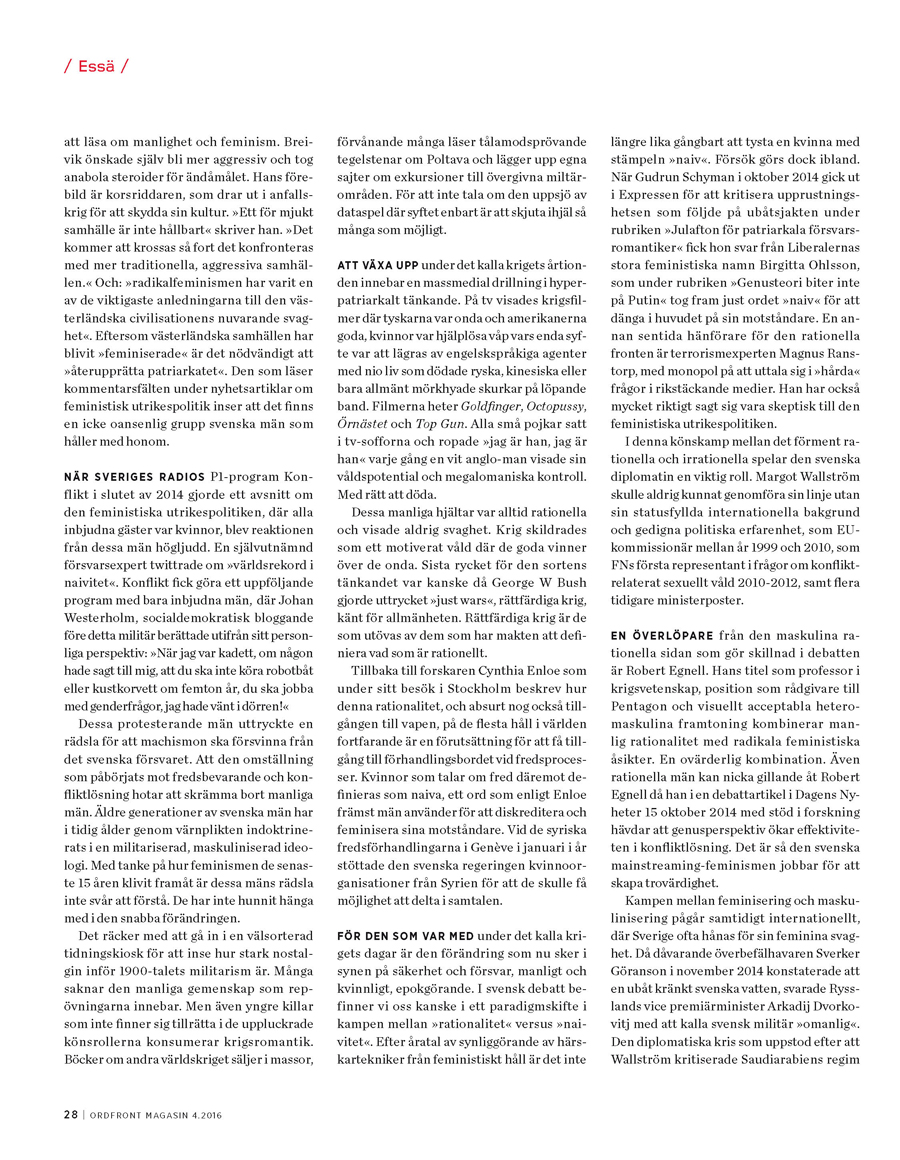
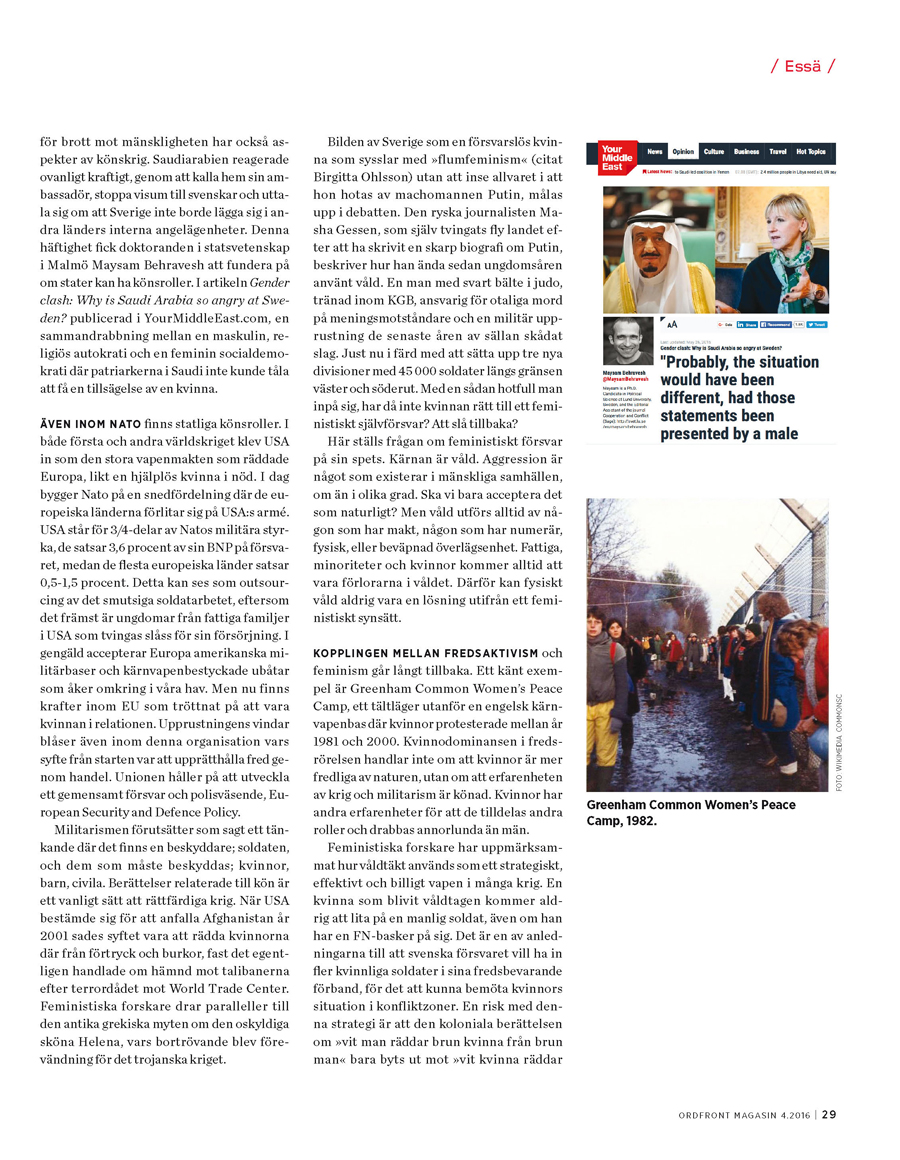
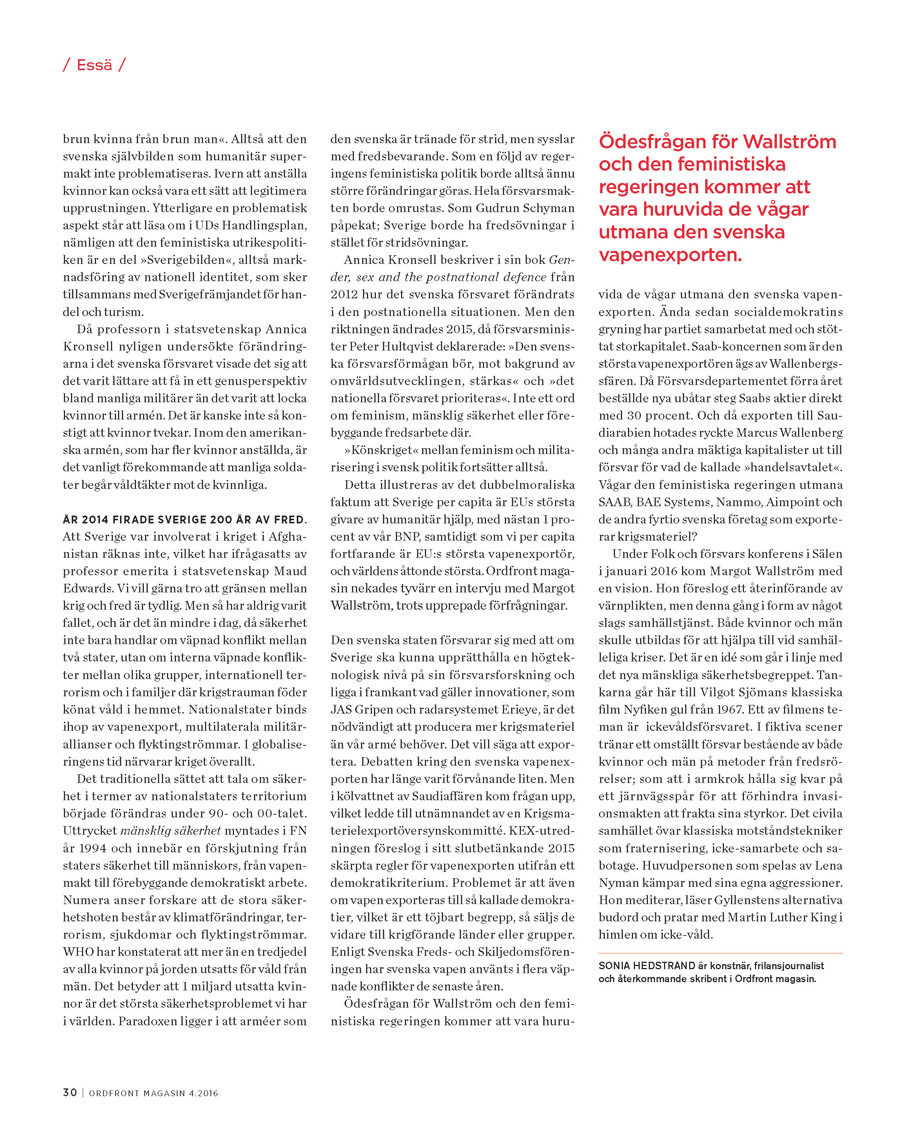
Feminism and weapons on export
English translation
In October 2014, the newly-elected Swedish Prime Minister presented a feminist government consisting of fifty percent women and fifty percent men. Foreign Minister Margot Wallström explained that she intended to pursue a feminist foreign policy, supported by the United Nations revolutionary Resolution 1325 on Women, Peace and Security from 2000 when, for the first time, women's organizations were invited to make women's role in war visible.
The feminist foreign policy would then permeate all areas of the Ministry of Foreign Affair’s activities. The action plan for how this will be addressed has six overall objectives concerning; Combating sexual violence in conflict situations, women's human rights in humanitarian situations, participation in peace processes, economic empowerment, and sexual and reproductive rights.
The Swedish Ministry of Foreign Affairs is headed by three female ministers. The Ministry has initiated an international network for women peace negotiators, they have networked with female foreign ministers and female ambassadors, and commissioned Swedish embassies to focus their work on women and peace. In June 2016, following Wallström's targeted campaign, Sweden received a seat on the UN Security Council. Since 2015, Sweden's efforts in Afghanistan between 2002 and 2014 have also been investigated with a focus on gender perspective.
In addition, foreign minister Wallström has positioned herself internationally through media statements. In 2015, she criticized Saudi Arabia's regime for crimes against humanity on the grounds that a blogger was sentenced to whipping punishment. She criticized Israel for pursuing an "aggressive politics" and named ”Putin’s reign of terror" after the murder of opposition leader Boris Nemtsov. From the point of view of the political right, these positions have fueled some ridicule. Even the international media has laughed at Swedish women fighting Putin with feminism. In interviews, Wallström has addressed this by quoting Mahatma Ghandi: "First, they ignore you, then they laugh at you, then they fight against you, and then you win."
An area where feminist foreign policy has reached far is the introduction of gender perspective within the Armed Forces. Particularly through the development of the Nordic Center for Gender in Military Operations, a knowledge center based in the Stockholm suburb of Kungsängen, which was started in 2012 to train gender advisors for the Swedish defense. The Gender Center is also responsible for gender education in NATO, and foreign militaries from all over the world come here for courses, to become aware of the importance of gender perspective in military operations.
Sweden is thus trying to export gender equality to other countries' military forces. The idea behind this is that equality leads to more peaceful communities, as confirmed by anthropological research.
During the Cold War, Sweden was one of the world's most fortified countries. This little security-loving country wanted to assure its ”non-alignment during peace aimed at neutrality in war”, for example by digging a large number of underground military facilities including a secret reserve capital known as the ”The Zone" in an unknown location in the country.
Sweden is full of bizarrely fortified sites, like the old Tingstäde citadel in northern Gotland, buried in the field, covered by reinforced concrete, protected by cannons that could circle 360 degrees, where the total food and money supply of the entire island could be stored. Due to the swift development of technology, these paranoid fortifications were often obsolete even before they were operational.
The fall of the Berlin Wall in 1989, the disappearance of the Soviet Union and the Warsaw Pact was the biggest change in European security politics in modern times. And it took place peacefully, without violence.
In light of this and of technical progress, in the 90s the Swedish government realized that ground defences were hopelessly outdated and began dismantling them. Gotland's four regiments were shut down. Underground aerodromes were abandoned, bunkers were boxed up, tanks were scrapped, ancient heavy khaki green bikes, ribbed underwear and itchy pull-overs were sold out to teenagers.
The new approach was to focus on high tech, monitoring and programming to meet the threats of the new worldview. But the money never came. We were said to live in an unusually peaceful time, and the state went on to search for new menaces, known as "internal threats" in the form of more or less militant small far right or left wing groups, which were busily mapped by Säpo, the security police.
The military alliance NATO, which was started after World War II as a counterforce against the Soviet Union, did not retire after the fall of the Warsaw Pact, but instead began to expand and embark on the former East. NATO has continued to grow, currently has 28 member states, and has become an active military force on a global scale. During the 1999 Balkan War, NATO attacked Serbia without a mandate from the United Nations, and has since then been commissioned by the United Nations in Afghanistan in 2001 and in Libya 2011. Today, the NATO countries represent 70 percent of the world's total military spending.
In Sweden, the slimming of the defense rolled on, until one day in March 2014 when Russia annexed the Ukrainian Crimean Peninsula on the Black Sea. The UN General Assembly condemned the aggression. The old fear of the Russian woke again around the Baltic Sea and NATO stepped up their exercises. In October 2014 there was submarine hunting in the Stockholm archipelago again and memories of the Cold War were revived. Six months later, Defense Minister Peter Hultqvist ordered two new submarines of the privately owned weapons producer Saab for the price of 9 billion Swedish krona.
Suddenly, a strong rush for rearmament rose in Sweden. Many argued that the neglect of the defense over the past 25 years had been naive. In April 2015, a new defense agreement added 13.7 billion for the period 2016-20. The Armed Forces began re-militarizing Gotland. A brand new facility is now being built on the huge Tofta shooting range south of Visby, at a cost of one billion kronor. It is the first new establishment of a garrison in Sweden since the 80's, and will soon host 300 soldiers.
During the Baltops exercise in the Baltic Sea in the summer of 2015; 17 nations, 5 600 men, 60 ships and 50 combat aircrafts participated, led by the United States. American Marine Corps disembarked on the Baltic shore of Österlen. The Center Party and the Christian Democrats changed their view in favour of a NATO membership and the right alliance parties wanted an examination of a possible Swedish entry into NATO. At the same time, an alternative Nato study was organized by disarmament experts Hans Blix and Rolf Ekeus. In May 2016, after a parliamentary decision, Sweden signed the Memorandum of Understanding, that makes it the country closest to NATO without being a member. Which led many to question Sweden’s neutral status in the event of a conflict.
Swedish foreign policy's swing against feminism and peace work coincides with an opposite movement in favour of increased militarization.
Militarization is growing not only in Sweden but throughout the world. UNHCR reported last year that more people than ever find themselves in flight from conflicts and persecutions, about 60 million people. In recent years, total defense spending increased worldwide. At the same time, nationalism is on the rise in European countries such as Hungary, Poland, Greece, Finland and Turkey.
American Professor of Political Science Cynthia Enloe has researched militarization with a gender perspective since the 1970s and has published several books. In Globalization & Militarism - feminists make the link, she defines the concept of militarism as both a process and a set of values that include; Trust in a commanding hierarchy, the valuation of physical strength, the notion of a protector and someone who needs to be protected, the belief that it is natural to have enemies and the idea that a state without an army is no real state.
According to Cynthia Enloe, militarization works well with globalized capitalism, often at the expense of women. Since the 1970s, when major western companies have been looking for labour made cheap, they found it in young women native to military dictatorships. First Korea, then Indonesia, Vietnam and China. Swedish H&M recently opened a factory in the dictatorship of Ethiopia. The local military regimes ensure that the young female workers who make our clothes can not strike for better conditions. The consumption of tourist trips to Thailand is another example. In 2014, a military coup was carried out in the country, but well off Europeans continue to travel there unconcerned, not to mention the sexual exploitation of Thai women in which Western men participate.
In the same neo-colonial spirit, the largest exporters of weapons are situated on the northern, richer part of the globe, while buyers are in the South, especially in poor countries in Africa. A prosperous country such as Sweden enriches itself at the expense of more vulnerable people's security. Sweden's latest arms deal in February 2016 went to United Arab Emirates, a country where sharia law prevails, women's rights are severely reduced, and the majority of residents are Philippine maids, as well as Indian and Pakistani guest workers who struggle in bad working conditions and without civic rights.
Once upon a time, it was a male privilege to work for the state. Government jobs were well paid, well-considered and safe. With the breakthrough of neoliberalism in the 1980s, there has been a shift of status and power away from the public sector to the private sector. Underfinanced government armies create a need for more ”professional” alternatives. In combination with a global market, it has led to the emergence of private security companies. States outsource the worst assignments to poorer and more desperate workers through staffing companies. One of the best-known examples is Blackwater International, a company with a pronounced macho image, that was hired by the Pentagon to do the dirtiest jobs during the invasions of Afghanistan and Iraq. Blackwater received criticism for their appearance when in 2004 they were hired to keep order on the streets in New Orleans after the chaos that followed hurricane Katrina. An assignment they performed in a nearly paramilitary manner, patrolling in SUVs with tinted windows, dressed in full combat wear, waving automatic weapons at ordinary citizens. After Blackwater’s contract workers were convicted in US court for killing 17 civilians in Baghdad in 2007, the company changed its name and appearance.
The example of Blackwater shows how militarization and masculinization coincide, and how manhood is often constructed in direct relation to violence. The phenomenon has given rise to the concept of hypermasculinity. The Lego soldier as an invincible cowboy, a lone warrior, or the Japanese drifting samurai, ronin, who has been romanticized ad nauseam among teenage boys all over the world. This may seem like a bizarre macho culture that is far from the renowned Swedish equality. The action plan for feminist foreign policy even states the goal to counteract ”destructive masculinities". But from Scandinavia comes one of the more hardcore propagandists for hypermasculinity.
In Anders Behring Breivik’s A European Declaration of Independence manifesto, emailed out on the day of his terrorist acts in Norway in 2011, there is a lot of interesting things to read about manliness and feminism. Breivik himself wanted to become more aggressive and took anabolic steroids for the purpose. His role model is the Crusader, who goes to war to protect his culture. "A soft society is not sustainable," he writes. "It will be crushed as soon as it is confronted with more traditional aggressive societies." And: ”radical feminism has been one of the most important reasons for the current weakness of Western civilization." Because western societies have been "feminized" it is necessary to "restore patriarchy". Anyone who reads the comments under news articles about feminist foreign policy realizes that a considerable group of Swedish men agree with him.
When in late 2014, Swedish Public Radio broadcast a programme about the new feminist foreign policy, with an all female group of invited guests, the reaction from these men was noisy. A self-appointed defense expert spoke of "world record in naivety". The show had to make a follow-up with only men invited, where Johan Westerholm, Social Democratic blogger and former military, recounted from his personal perspective: "When I was a cadet, if someone had told me: ”you will not drive a robot boat or a coastal corvette in fifteen years from now, you’re going to work with gender issues, I had turned around and walked away immediately!"
These protesting men expressed a fear that machoism would disappear from the Swedish armed forces. That the transformation that has started towards peacekeeping and conflict resolution threatens to scare off so called ”manly” men. Older generations of Swedish men have, at an early age, been indoctrinated by military service in a militarized, masculinized ideology. Given how feminism has stepped forward in Sweden over the last 15 years, these men's fear is not difficult to understand. They have not been able to keep up with the rapid change.
It is sufficient to step into a regular newsstand to realize how strong the nostalgia of 20th century militarism is. Many lack the male community that the recurring military exercices meant for their identity as men. But even younger boys who do not find themselves in the dissolved gender roles consume war romanticism. World War II books sell in volume, surprisingly many read demanding heavy books about Poltava and publish their own websites about excursions to abandoned military areas. Not to mention the plethora of computer games whose only purpose is to kill as many as possible of "the others".
Growing up during the decades of the Cold War meant a mass medial drill in hyperpatriarchal thinking. On television, war films were displayed, where the Germans were evil and the Americans fair; women were young helpless victims whose sole purpose was to be conquered by English-speaking agents with nine lives who incessantly killed Russian, Chinese or just plain dark-haired villains. The films were called Goldfinger, Octopussy, Where Eagles Dare and Top Gun. All the little boys sat in front of the television set and shouted ”I'm him! I’m him!” each time a white anglo-man showed his violent potential and megalomanic control. With a licence to kill, as it were.
These male heroes were always rational and never exposed weakness. War was depicted as a motivated violence where the good win over the bad. The last expression of that paradigm was perhaps when George W. Bush made the phrase "just wars" known to the public. Righteous wars are wielded by those who have the power to define what is rational.
This rationality, and absurdly enough also the availability of weapons, is in most parts of the world still a prerequisite for access to the negotiating table in peace processes. Women who speak of peace, on the other hand, are defined as naive, a word commonly used by men to discredit and feminize their opponents.
For those present during the days of Cold War, the change that is now taking place in questions of security and defense, and of masculine and feminine, is epoch-making. In the Swedish debate, we may be experiencing a paradigm shift in the struggle between "rationality" versus "naivety". After decades of feminists analyzing, naming, critizing and making visible the supression techniques used to master women and subordinates, it is no longer possible to silence a woman with the label "naive". However, attempts are sometimes made. In October 2014, Feminist party spokeswoman Gudrun Schyman wrote an article entitled "Christmas Eve for Patriarchal Defense Romantics" in the evening paper Expressen. In her text she criticisied the rearmament rush that followed the submarine hunt. She was answered by the Liberal feminist Birgitta Ohlsson, who, under the heading ”Gender theory does not touch Putin”, smacked her opponent with the small but oh so efficient word "naive".
Another recent spokesman for the rational front is the "terrorism expert" Magnus Ranstorp, with the monopoly of expressing himself on "hard" issues in national media. He has also declared himself to be skeptical about the feminist foreign policy.
In this gender battle between the alleged rational and irrational, Swedish diplomacy plays an important role. Margot Wallström could never have realized her program without her high status international background. Her political experience as EU Commissioner between 1999 and 2010, as the UN's first representative on conflict-related sexual violence 2010-2012, as well as several former ministerial posts, she has the greatest political experience in the government.
A deserter from the masculine rational camp whose contribution has an impact on the debate is Robert Egnell. His title as a professor of ”war science”, position as an advisor to the Pentagon and visually acceptable heteromascular appearance combines male rationality with radical feminist views. An invaluable combination. Even rational men can nod approvingly when Robert Egnell in a debate article in Dagens Nyheter October 15, 2014, of course with support of academic research, claims that gender perspective increases the effectiveness in conflict resolution. That is how the Swedish mainstreaming feminism creates credibility.
The struggle between feminization and masculinization simultaneously goes on at an international level, where Sweden is often ridiculed for it’s feminine weakness. When the Swedish commander-in-chief Sverker Göranson in November 2014 confirmed that a submarine had violated Swedish waters, Russia's Deputy Prime Minister, Arkadij Dvorkovitj, called Swedish military "unmanly".
The diplomatic crisis that arose after Foreign minister Wallström criticized Saudi Arabia's regime for crimes against humanity also has aspects of gender war. Saudi Arabia’s response was unusually strong, calling home it’s ambassador, cancelling visas for Swedes and declaring that Sweden should not interfere in other countries' internal affairs. This fierceness led Maysam Behravesh, a doctoral student in political science at Malmö University, to consider whether states can have gender roles. In his article ”Gender Clash: Why is Saudi Arabia so angry at Sweden?” published in YourMiddleEast.com, Behravesh argues that Saudi Arabia is a patriarchal country whose leadership can not tolerate being reprimanded by a woman from a supposedly feminine country such as Sweden.
Even within NATO there are state gender roles. In both the first and second world war, the popular narrative is that United States stepped in as the great masculine strength of arms that saved Europe, the helpless woman in need. Today, NATO builds on an imbalance in which European countries rely on the US army. The US accounts for 3/4 of NATO's military force, investing 3.6 per cent of its GDP on its defense budget, while most European countries invest 0.5-1.5 per cent. This means that Europe is outsourcing it’s dirty soldier-work to poor American youth who are forced to fight for their livelihood in the United States professional army.
In return, Europe accepts US military bases and huge submarines carrying nuclear weapons that travel our seas. But within the EU today forces exist that are tired of being seen as the woman in the relationship. Rearmament winds blow within this organization too, whose purpose from the outset was to maintain peace through trade. The Union is developing a common military and police force, European Security and Defense Policy.
Militarism requires a thinking where there are protectors and those who need to be protected. Stories related to gender are a common way of justifying war. When the US decided to attack Afghanistan in 2001, it was said that the aim was to save women from oppression and burqas, although it was really about revenge against the Taliban after the terrorist attack on the World Trade Center. Feminist researchers draw parallels to the ancient Greek myth of the innocent beautiful Helena, whose abduction was used as the pretext for the Trojan war.
The tale of Sweden as a defenseless woman, engaged in naive feminism, not able to comprehend the gravity of being threatened by the macho man Putin, is often told in the debate. Russian journalist Masha Gessen describes in her biography of Vladimir Putin how he has used violence in every little conflict possible since his youth. A man with a black belt in Judo, trained in the KGB, responsible for several murders of opponents and a heavy military rearmament in recent years. Right now he is in the process of setting up three new divisions with 45'000 soldiers along the west and south boundaries of Russia. With such a threatening man at close range, is not the woman entitled to a feminist self-defense? To fight back?
Here the question of feminist defense strategy is posed at its peak. The core is violence. Aggression is something that exists in human societies, albeit to varying degrees. Should we just accept it as natural? But violence is always carried out by someone who has power. By someone who has financial, numerical, physical, or armed superiority. The poor, minorities and women will always be losers in violent conflict. Therefore, physical violence can never be a solution based on a feminist approach.
The link between peace activism and feminism goes far back. A well-known example is the Greenham Common Women's Peace Camp, a tent camp outside of an English nuclear weapons base where women protested between the years 1981 and 2000. Women's dominance in the peace movement is not evidence of peacefulness by nature, but due to the fact that the experience of war and militarism is gendered. Women are assigned different roles and are afflicted in different ways than men.
Feminist researchers have noted how rape is used as a strategic, efficient and cheap weapon in many wars. A woman who has been subjected to rape will never confide to a male soldier, even if he is wearing a light blue UN beret. This is one of the reasons why the Swedish armed forces aims to bring in more women as soldiers in their peacekeeping relations to address the situation of women in conflict zones. One risk with this strategy is that the colonial story of "white man saves brown woman from brown man" is only replaced by "white woman saves brown woman from brown man". Thus, the Swedish self-image as humanitarian superpower remains intact.
The zeal to hire women can also be a way to legitimize the rearmament. Another problematic aspect can be read about in the Foreign Ministry's action plan; That the feminist foreign policy is part of the "Sweden image", that is, the promotion of national identity, which takes place together with the powerful capitalist corporations of Swedish commercial and industrial life. Feminism reduced to a nationalist trade mark to make money on.
When Professor of Political Science Annica Kronsell recently examined the changes in the Swedish defence strategy, it became apparant it has been easier to implant gender perspective among male soldiers than it has been to attract women to the army. And no wonder that women are hesitant to join up. Within the US Army, which has more women soldiers, rape committted by male soldiers against female is common.
In 2014, Sweden celebrated 200 years of peace. The fact that Sweden was involved in the war in Afghanistan does not count, as questioned by Professor Emerita in Political Science Maud Eduards. We like to think that the boundary between war and peace is clear. But that has never been the case, and is even less so today, when security is not just about armed conflict between states, but about international terrorism, internal armed conflicts between different groups, and conflicts in families where war traumas feeds gendered domestic violence. National states are tied together by arms exports, multilateral military alliances and streams of refugees. In globalization, war is present everywhere.
The traditional way of talking about security in terms territory of nation states began to change during the 1990s. The term ”human security” was coined in the UN in 1994 and involves a shift from state security to that of people, from strength of arms to preventive democratic work. Today, researchers hold climate change, terrorism, diseases and the situations for refugees as major security threats.
WHO has found that more than a third of all women on earth have been subjected to violence by men. This means that the men who practice violence against 1 billion women are the biggest security problem in the world. A paradox lies in the fact that armies like the Swedish one are trained for battle, but are in charge of peacekeeping. If this government's feminist policy is serious, greater changes should be made. The entire Armed Forces should be redeployed. Sweden should have peace exercises instead of fight exercises.
Annica Kronsell describes in her book Gender, Sex and the Postnational Defense from 2012 how the Swedish defense changed in the postnational situation. But that direction was changed again in 2015, when Defense Minister Peter Hultqvist declared: "The Swedish defense capability should be strengthened, in the light of world-wide development” and "national defense is prioritized". Not a word about feminism, human security or preventive peace work there.
So the "gender war" between feminism and militarization in Swedish politics continues.
This is illustrated by the double moral fact that Sweden per capita is EU's largest humanitarian aid donor, with almost 1 percent of our GDP, while still per capita being the EU's largest arms exporter, and one of the world's largest.
The Swedish government defends this situation with the importance of maintaining a high technology level in its defense research and being at the forefront of innovations such as JAS Gripen and the Erieye radar system. Because of this it is necessary to produce more military equipment than our army needs. That is, to export. Debate about Swedish arms exports has long been surprisingly absent. But the issue arose in the wake of the Saudi affair, which led to the appointment of a Military Material Export Review Committee, KEX. The KEX investigation proposed in its final report 2015 to tighten rules for arms exports based on a democracy criterion. The problem is that even if arms are exported to so-called democracies, which in itself is a stretchable concept, they are resold to other countries or groups at war. According to the Swedish Peace and Arbitration Society, Swedish weapons have been used in several armed conflicts in recent years.
The fundamental question for this feminist government will be whether they dare challenge Swedish arms exports. Ever since the dawn of Social democracy in Sweden, the party has collaborated with and supported big capital. The Saab Group, which is the largest arms exporter, is owned by the Wallenberg family. When the Ministry of Defense ordered new submarines in 2015, Saab's shares increased directly by 30 percent. And when exports to Saudi Arabia were threatened, Marcus Wallenberg and many other powerful capitalists protested in favour of what they with an embellishment called the "trade agreement”. These are the same companies that secretely helped german corporations continue production of weapons for the nazi regime during the second world war.
Does the feminist government dare to challenge SAAB, BAE Systems, Nammo, Aimpoint and the forty other Swedish based companies that produce and export military equipment?
During the People and Defense Conference in Sälen in January 2016, Margot Wallström presented a vision. She proposed the reintroduction of military service, but this time in the form of something that sounded more like community service. Both women and men would be trained to help in social crises, such as in the event of the huge refugee influx from Syria. It is an idea in line with the concept of human security. Thoughts here go to Vilgot Sjöman's classic film Curious Yellow from 1967. One of the themes of the film is the non-violence defense. In fictional scenes, a converted defense force, consisting of both women and men practice methods from peace movements; such as blocking railroad tracks by linking arms to prevent the invading power from transporting its forces. Civilians exercise classical resistance techniques such as fraternization, non-cooperation and sabotage. The main character played by Lena Nyman is struggling with her own aggressions. She meditates, reads Gyllensten's alternative ten commands and talks with Martin Luther King in the sky about non-violence. A film tip for Sweden's feminist government.